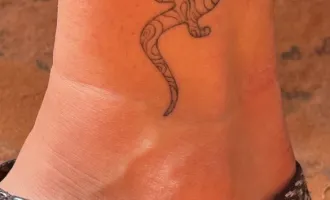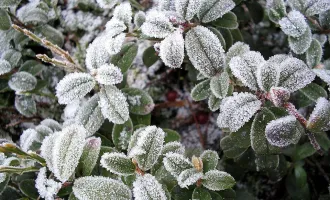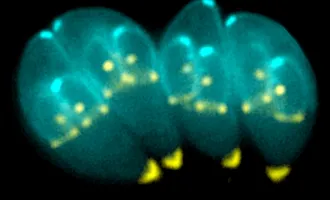
Laura Persson delivers her winning presentation, “The Wormnado: What a Tiny Worm Can Teach Us about Collective Behavior,” during Postdoc Slam 2023 at Byers Hall on Sept. 19.
Photo by Erin Lubin
Wormnado Takes UCSF Postdoc Slam 2023 by Storm
A riveting story told with humor and heart about the social behavior of Caenorhabditis elegans — affectionately known as worms — won the approval of judges and audiences alike at the annual UCSF Postdoc Slam 2023, held on Sept. 19 at the Mission Bay Byers Hall Auditorium.
Laura Persson, a postdoctoral fellow in the L’Etoile Lab, walked home with both the first and audience’s choice awards — worth $4,000 and $750 respectively — for her talk titled “Wormnado: What a Tiny Worm Can Teach Us about Collective Behavior”.
“I really do love this project and think these worms are fascinating,” Persson said, “so I was very happy that I was able to convey that effectively to the audience.”
Postdoc Slam is a meaningful opportunity for postdocs to hone and showcase their communication and public speaking skills. The challenge: to present your research in a compelling, engaging manner in just under three minutes, using easy-to-understand language.
Ten finalists across all UCSF departments were selected via a preliminary video entry round and received individual coaching from the Office of Career and Professional Development (OCPD) to help them polish their talks for the final round.
You must be wondering, what even is a “Wormnado”? It all started when Persson noticed something interesting happening in a fateful plate of worms.
“It’s late at night, you’ve been staring at a lot of worms, so you’re like, hang on, is it just me, or do these worms look kind of, organized?” Persson pondered aloud to the audience.
Pearson was perplexed at how these tiny worms on a plate could, in her own words, “execute a choreography more advanced than the average highschool marching band.” This drew chuckles from the crowd.
After months of research, Persson found that after placing a lid onto a dish full of worms, the entire population of worms simultaneously oriented themselves parallel to the edge of the dish and migrated in a bidirectional spiral to the center— a Wormnado.
“The more worms you have on the dish, the better they get at organizing,” Persson said.
This signifies that the worms must be communicating with one another, despite being unable to see or hear.
Persson continued to deliver iconic one-liners seamlessly within her narrative, sending her fellow scientists into guffaws. .
“But why should we care how these worms ‘nado’? What could I possibly tell my relatives?” she said.
The reason to care, Persson said, was that collective behaviors are often based on recycled principles, and by understanding the Wormnado, we can better understand collective behavioral networks across different contexts.
“I love this project, because it could have only happened by accident,” Persson said. “It reminds us that doing science is about being curious and open-minded; it’s about paying attention when nature does something surprising, because that's where we find truly novel biology.”
On future directions for the project, Persson said:”I’m currently trying to understand the different cues that the worms use to communicate during the Wormnado and the particular neurons that are involved.
“I hope to do some live imaging of neural activity in worms that are spiraling which will allow us to identify the neural circuits that are important,” she continued, “and I’m excited to see what neural activity will reveal about the principles of communication during collective behavior.”
Kritika Khanna, PhD, member of the Fahy lab, emerged in second place, winning $2,000. Her talk, “Asthma on Fire: Keep calm, It’s a False Alarm,” focused on understanding the underlying pathway of asthma and harnessing that knowledge to treat asthma patients here at UCSF.
In third place was Christopher Williams, MD, member of the Butte Lab, who uses natural language processing to uncover the racial disparities and biases in the triaging of Black, Asian and Hispanic patients in hospital emergency rooms.
The three winners had this to say about preparing for Postdoc Slam: practice, practice, practice!
“I practiced it a lot, both during designated practice ‘sessions’ but also at random times — getting ready in the morning, sitting in traffic, waiting on an experiment,” Persson said. “I wanted to be comfortable enough to deliver it without losing my train of thought if something distracting happened in the audience.”
For Khanna, the coaching session that Postdoc Slam showrunner Erik Rotman organizes for participants was very helpful.
“Try to find a simple analogy for the work, and perhaps try to weave it into the entire talk such that it makes it easier for everyone to follow,” Khanna added.
“Also, think about how to vary the tone of your voice and pace of delivery to make the most impactful points as punchy as they can be,” Williams said.
Persson added, “This might not be the vibe that fits for everyone, but I think a good way to think about writing the three-minute talk is, how does the fact that I specifically am working on this project make it unique?”
Postdoc Slam was part of the larger National Postdoc Appreciation Week, organized by the Office for Postdoctoral Scholars. Other activities during the week included workshops from OCPD and professional photographer headshots.
This year’s Slam judges included Curtis Chinn, MA, a teacher in the San Francisco Unified School District, Won Ha, UCSF's vice chancellor of Communications, and Audra J. Johnson, PhD, a former UCSF postdoctoral fellow and Medical Science Liaison at Genentech.
Former Executive Vice Chancellor and Provost and Grad Slam 2023 live event judge Daniel Lowenstein, took over the baton from Dean of the Graduate Division, Nicquet Blake, and hosted the entire event.
“These are ten incredible postdocs who represent more than a thousand postdocs here at UCSF,” Lowenstein said, “and we cannot thank you enough for all the work that you do on behalf of all the people we serve.”



